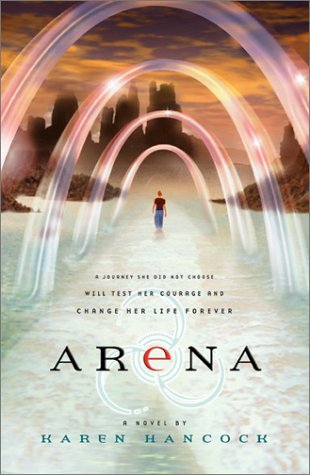Karen Hancock, Arena
reviewed by Danielle L. Parker

|
|
Arena
Author: Karen HancockPublisher: Bethany Press, 2002 Paperback: $12.99 U.S. Length: 393 pages ISBN: 0-7642-2631-2 |
But I admit one of the biggest surprises has been just how many people read what I suppose I’ll dub Christian SF. Elderly couples pester me for the latest Tim LaHaye, and soberly press me to read the books myself when they return them. I’ve often wanted to ask these readers, but never dared, what is the appeal of these books to them. Are they reading them simply as entertainment? Do they perceive Tim LaHaye and his co-authors as genuine prophets of our time? Don’t they perceive a possibility of blasphemy in these might-be speculations, these thrillers that re-grind and regurgitate Revelations through a pop cultural lens? Why do they read them? Why do they take them so seriously? What symptom of our time is the great popularity of these books, from LaHaye to Dan Brown to Anne Rice?
A patron at the library recommended a Christian SF book entitled Arena to me, and I finally decided to break down and read it. It began promisingly. Callie, our protagonist, is a woman with an obsessively self-protective nature, a walking collection of phobias and fears. But she’s trying to do something about it. Her recklessly adventurous friend Meg talks Callie into participating in a scientific trial that claims it can help Callie overcome her fears. Strangely, the young men who seem to manage the experiment are all young, good-looking, and beardless (I suppose angels are not supposed to be hairy).
But Callie and Meg have been drastically tricked. As soon as the ink dries on her authorization, Callie finds herself on an alien world, with scant instructions, cannibalistic Troglodytes — who used to be human exiles like themselves — and woman-eating vegetation all around. (It does not pay to enter into angelic contracts of any kind lightly, it seems). She’s in trouble, and right off the bat, she gets into worse trouble by not following instructions and giving into her phobia of heights. A young man who’s not seen any good baths lately comes to her rescue, but he’s got fears of his own to overcome... and he’s been fighting for his life for five years. That promised Gateway to redemption seems a long way off to both Callie and her new friend.
I actually enjoyed the first third of the story, as Callie and her fellow exiles struggle to find their exit, overcome their personal demons, and stay alive in harrowing circumstances. But then we get six straight pages of information dump, and the author rears up and hammers us in the forehead with her blatant religious metaphors. God is the alien Elhanu, and the Aggillon, his people, are the good angels. There’s trouble in this peaceful galaxy-spanning empire, of course, and in a thinly disguised metaphor of Lucifer, there’s Prince Cephelus, who envied good Elhanu, and fell from grace with his fellow sinners. Now there’s the Arena, where the kidnapped humans give Elhanu a chance to show his goodness and how well they can follow his instructions to stay on the white path, and where, of course, the exiled followers of the fallen Prince get their chance to tempt and obstruct.
So this, then, is Christian SF? God as an alien? (Elhanu shows up later in the story in person, as a white-haired gentleman with a knack for giving good self-help and tough-love advice). I almost put the book down, but decided to slog through to the end of Callie’s adventures.
All the while, though, I could just see our modern Christian SF writer explaining matters to those old time martyrs who insisted on dying so messily and unnecessarily in the real, that is, Roman, arenas. There’s no problem; Jupiter is simply a metaphor for Jehovah, so go ahead and bow; yes, I know that sounds confusing, but just read this story about a lion who’s really God, and this story about an alien who’s really God, and you’ll start to get the picture... what’s in a name, eh?
Arena is actually a fairly interesting book, in terms of entertainment, although we pass from an dark first half (which includes almost-rapes and cannibalism) to a second half whose Got Pseudo-Christian Religion may be equally hard to take for many people (including myself). But there’s plenty of action and tension in both halves.
Still, I think I’ll stick to the source for my further religious instruction. Anything I need to know about the interaction of God, Man, and the Devil I think I can find in the book of Job. I think names do matter. Jehovah is not interchangeable with Aslan the Lion or Augustus the God Emperor or Elhanu the Alien — or Allah either. Not my God, anyway.
Copyright © 2006 by Danielle L. Parker

